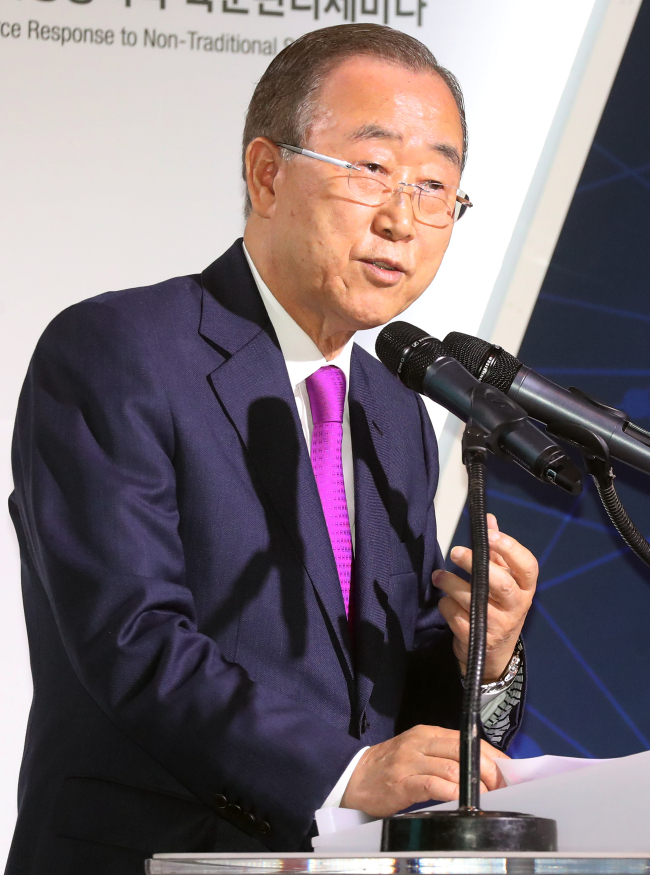With the United Nations imposing a series of sanctions against North Korea, former UN Secretary-General Ban Ki-moon on Monday urged the international community to brace itself for all possibilities, including military options.
“We must be ready to confront any consequences and any eventualities, including military options, to address (North Korea’s threat),” Ban said in a security forum in Seoul. “Otherwise, North Korea would be emboldened.”
Noting that North Korea’s nuclear program poses the most serious threat here since the Korean War, Ban asserted that the international community has to take “all necessary measures when chips are down.”
His remark came amid growing frustrations over North Korea’s relentless pursuit of nuclear ambition and its constant defiance of UN sanctions. Pyongyang launched a ballistic missile Friday, just three days after the UN passed economic sanctions over the regime’s sixth nuclear test on Sept. 3
 |
Former UN Secretary-General Ban Ki-moon. Yonhap |
Since North Korea conducted its first nuclear test in 2006, the UN has passed a total of 10 resolutions targeting North Korea‘s economic activities related to nuclear ambition. The latest one, adopted after Pyongyang’s sixth nuclear test, cleared the UN in the shortest amount of time since 2006.
“Such (a) record of caution by the UN Security Council clearly demonstrated (the) strong and firm will of the international community to deter North Korea from possessing nuclear and ballistic missile capabilities,” Ban said.
Ban was one of the speakers addressing the 10th Pacific Armies Chiefs Conference held in Seoul. Among those who attended were South Korean Army’s chief of staff Gen. Kim Yong-woo and his US counterpart Gen. Mark A. Milley.
Chinese People’s Liberation Army has also sent its delegate – Lt. Gen. You Haitao. He is the first Chinese senior military officer to join South Korea’s security seminar since South Korea and the US agreed to deploy the Terminal High Altitude Area Defense anti-missile system on the peninsula last year.
Describing North Korea’s nuclear threat as the most “urgent and grave” threat in the region, the participants stressed the need for a firm response to North Korea and vowed to enhance multilateral ties to resolve the security crisis.
“We will work with the international community to come up with a strong response toward North Korea … North Korea should realize that dialogue and cooperation, not nukes and missiles, are the only means to protect its security and guarantee a bright future,” President Moon Jae-in said via a video message.
In a closed-door session, Gen. Vincent K. Brooks, commander of the US Forces Korea, and security scholars from Seoul and Washington discussed ways to enhance partnership among ground forces in the Pacific region.
Among the participants are Choi Young-jin, South Korea‘s former ambassador to the US; Shin Beom-chul, professor at the Korea National Diplomatic Academy; and Michael O’Hanlon, a senior research fellow at the Brookings Institution.
Scheduled to run through Thursday, the event brought together army chiefs of staff and senior commanders from 29 Indo-Asia-Pacific countries. The 2017 event is held under the theme of “Unity of Effort: Building Civil-Military Partnerships in Land Force Response to Non-Traditional Security Threats.”
By Yeo Jun-suk (
jasonyeo@heraldcorp.com)








